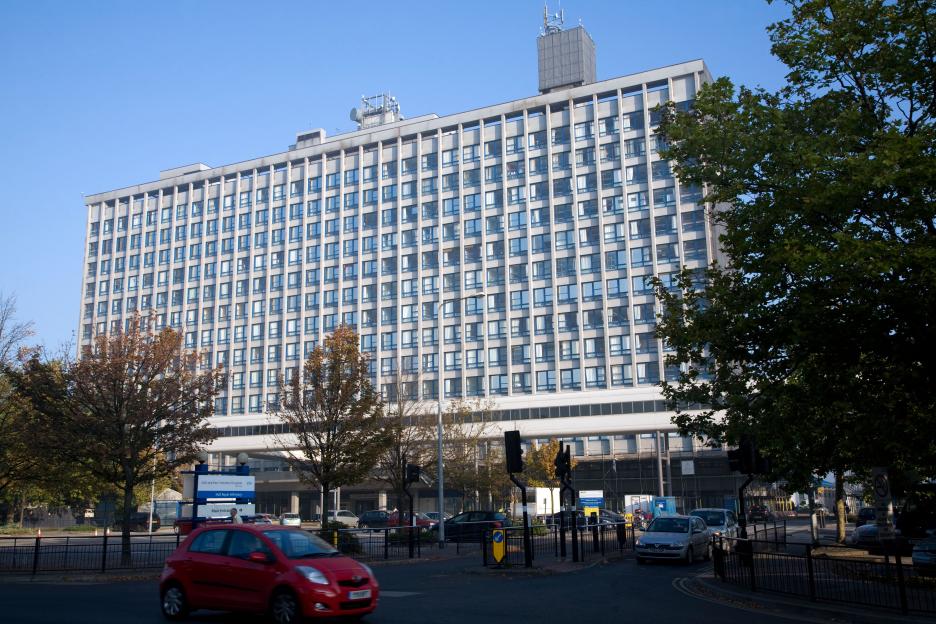A BRAINWAVE test could detect early signs of Alzheimer’s disease in just three minutes – years before clinical diagnosis would even be possible.
Researchers say the test, nicknamed ‘Fastball’, could even be used at home and serve as a cheap tool for those who struggle to get a diagnosis.
 Dr George Stothart (right) from the University of Bath, with volunteer John Stennard trying the Fastball
Dr George Stothart (right) from the University of Bath, with volunteer John Stennard trying the Fastball
 It records the electrical activity of the brain by placing small sensors on the scalp
It records the electrical activity of the brain by placing small sensors on the scalp
Fastball measures patients’ brain waves through the use of a headset that uses electroencephalogram (EEG) technology .
It records the brain’s automatic response to a series of flashing images displayed on a screen.
Its inventors, from the universities of Bristol and Bath, say it can detect subtle changes to brain waves during the very early stages of dementia .
A £1.5million funding boost from the government will allow it to be tested on 1,000 patients in Bristol to find out if it can be used for mass screening.
Researchers hope the test could slash five years off the average age of diagnosis.
Dementia is often diagnosed too late, they said, up to 20 years after it has started to develop and when it’s already damaged the brain beyond repair.
Currently, diagnosis relies on tests to assess people’s memory, which researchers have previously said can be limited and may be impacted by a person’s education, language skills and whether or not they’re nervous.
They claimed Fastball swerves these issues as the test assesses patients ‘passively’, without requiring participants to follow instructions or recall information.
Dr Liz Coulthard, from the University of Bristol, said: “Patients can wait a long time for diagnosis and some of our current tests can be inaccurate and stressful for them.
“A quick, easy-to-administer memory test, like Fastball, could transform that.”
A new study, led by experts from the universities of Bath and Bristol and published in the journal Brain Communications, included 52 patients with mild cognitive impairment (MCI) and 54 healthy older adults.
MCI refers to a decline in memory and thinking. Not all cases progress to Alzheimer’s disease, but it can be an early sign and risk factor for the condition.
As well as the Fastball test, patients on the trial also completed a number of neuropsychological assessments that tested their memory, their ability to pay attention and general cognitive function.
Researchers found Fastball could reliably identify memory problems in people with MCI.
 Researchers said the test could be used at home and detect brain signal changes in indicative of Alzheimer’s in minutes
Researchers said the test could be used at home and detect brain signal changes in indicative of Alzheimer’s in minutes
Patients with amnestic MCI – which involves significant memory loss, such as forgetting appointments and recent conversations – showed significantly reduced responses to the Fastball test compared to healthy patients and those with non-amnestic MCI.
Researchers re-tested the group after one year and found Fastball “showed moderate to good test-retest reliability” in healthy older adults.
The study also demonstrated for the first time that the test can be performed in patients’ homes.
Researchers now say the Fastball could also be used in GP surgeries and memory clinics to speed up diagnoses.
Lead author Dr George Stothart, a cognitive neuroscientist in the Department of Psychology at the University of Bath, said: “We’re missing the first 10 to 20 years of Alzheimer’s with current diagnostic tools.
“Fastball offers a way to change that – detecting memory decline far earlier and more objectively, using a quick and passive test.”
Alzheimer’s Society estimates there are around 982,000 people with dementia in the UK, but more than a third do not have a diagnosis.
The number is expected to rise to 1.4 million by 2040.
What are the early symptoms of cognitive decline?
WE all notice a natural decline in memory and thinking as we age.
This will be more pronounced in some people, as they experience memory and thinking problems that are mild but still noticeable.
This is described as mild cognitive impairment (MCI). Unlike dementia sufferers, people with MCI can still get on with day-to-day life.
Research suggests that two out of 10 people over the age
of 65 have MCI, according to Alzheimer’s Research UK.
About one in 10 people who’ve received an MCI diagnosis will go on to develop dementia.
Symptoms of MCI include:
Memory – Misplacing items or having trouble
remembering recent conversations.
- Attention problems – finding it difficult to concentrate,
e.g. while watching a TV programme or carrying out
duties at work - Disorientation – confusion about time, date or place
- Thinking skills – problems with planning or completing
tasks, e.g. managing money, or cooking a meal - Problems with communication and finding the right words
- Mood and behaviour changes – becoming irritable, anxious,
or feeling low
These symptoms may affect someone with MCI all the
time, or they might come and go.
There are steps we can take to keep our brains as healthy as possible. These include:
- Not smoking
- Doing regular physical activity
- Staying mentally and socially active
- Eating a healthy balanced diet
- Limiting the amount of alcohol we drink
- Having your hearing checked regularly
- Keeping blood pressure, blood sugar and cholesterol
levels in check
Dr Stothart added: “There’s an urgent need for accurate, practical tools to diagnose Alzheimer’s at scale. Fastball is cheap, portable and works in real-world settings.”
Chris Williams, chief executive of BRACE Dementia Research, which supported the study, said: “Fastball is an incredible tool that could offer anyone who, for whatever reason, cannot access a dementia diagnosis in a clinical setting.”
Reacting to the findings, Sir John Hardy, professor of neuroscience and group leader at the UK Dementia Research Institute at UCL, said: “Identifying individuals early for cognitive decline is going to be of increasing importance as therapies for Alzheimer’s and other dementias are developed and this protocol Fastball seems as if it may be helpful in this regard.
“What it does not do, and does not claim to do, is distinguish early Alzheimer’s from other causes of decline and this latter is also important.
“Because of this, it is likely that additional tests, biomarker or imaging, would also be needed for this second important aim.”
Dr Julia Dudley, head of research at Alzheimer’s Research UK, added: “Too many families face dementia without answers, with one in three people with the condition living without a diagnosis.
“Therefore it’s encouraging to see studies exploring potential ways to detect memory problems earlier.
“This study, in a small group of people, suggests that it can be used to measure mild memory impairment, which for some people can be an early sign of diseases like Alzheimer’s.
“However, as participants were only followed up one year later, we don’t know if those people will definitely go on to develop dementia.
“Longer-term studies in larger, diverse groups of people are needed to find out if this technology can predict how memory problems will unfold over time.”
Barriers to diagnosis
The trial results come as a new report by the Alzheimer’s Society warned that one in five people impacted by dementia receive no support.
A survey, carried out for the charity by Walnut Unlimited, included almost 3,500 impacted by dementia, such as patients, loved ones and unpaid carers.
Just a third said their experience of diagnosis was positive, while 52 per cent faced long wait times and 41 per cent had to see multiple healthcare staff.
Professor Fiona Carragher, chief policy and research officer at Alzheimer’s Society, said: “Almost a million people are living with dementia, yet its scale and the day-to-day realities often remain hidden.
Early signs of dementia
It's not unusual for your memory to lapse a bit as you get older.
But dementia is different from ‘just getting old’ as it will cause noticeable – rather than gradual – changes to mental abilities and make managing everyday tasks and activities increasingly difficult.
The symptoms of dementia may be small to start with, but get worse over time.
Below are some examples of possible signs.
Memory loss
Memory loss is a key sign of dementia. This can include:
- Forgetting something you were only recently told. You may ask for the same information repeatedly – for example, ‘Are the doors locked?’
- Putting objects in unusual places – for example, putting your house keys in the refrigerator.
- Being unable to learn new tasks, like how to use a new washing machine.
Planning and decision making issues
People with dementia can have difficulty with planning and decision making. This can include:
- Getting very confused when planning or thinking things through.
- Struggling to stay focused on a single task.
- Not making informed, careful decisions when dealing with money or looking at risks.
- Finding it hard to manage regular payments, budgets or monthly bills.
Problems with language and understanding
In people with dementia, this can manifest as:
- Having frequent problems finding the right word or regularly referring to objects as ‘that thing’.
- Finding it hard to take part in conversations.
- Regularly being unable to follow what someone is saying even without distractions.
Losing sense of time and place
Dementia can cause problems with orientation, including:
- Losing track of the date, season or the passage of time.
- Getting lost in a place that is familiar or that should be easy to find your way around – for example, a supermarket.
- Regularly being unable to follow what someone is saying even without distractions.
Problems with vision and perception
This can mean having problems making sense of what you see.
For example, having difficulty judging distances on stairs, or mistaking reflections or patterns for other objects.
Mood and behavioural changes
Finally, dementia can also make people act differently or shift their mood. This can mean:
- Becoming withdrawn and losing interest in work, friends or hobbies.
- Feeling unusually sad, anxious, frightened or low in confidence.
- Getting easily upset at home, at work, with friends or in places that usually feel comfortable or familiar.
Source: Alzheimer’s Society
“These findings tell us that far too many people are going without the help they need, whether it’s support after a diagnosis, trained care professionals, or someone to turn to when things get hard.”
The charity also found more than a third (35 per cent) of people living with dementia are scared of getting diagnosed, while 31 per cent are apprehensive about talking to healthcare professionals.
Professor Carragher said: “An early and accurate diagnosis is vital to enable people living with dementia to access the care, support and treatments they so desperately need.
“Those who have been able to access these treatments experienced benefits, but we simply aren’t diagnosing people early or accurately enough to see current and prospective treatments rolled out widely.”







